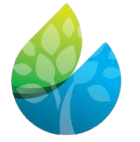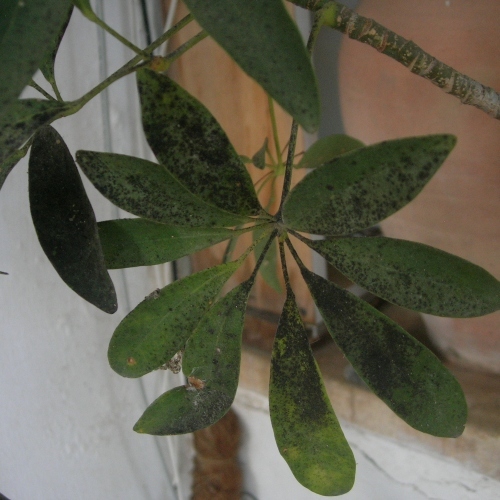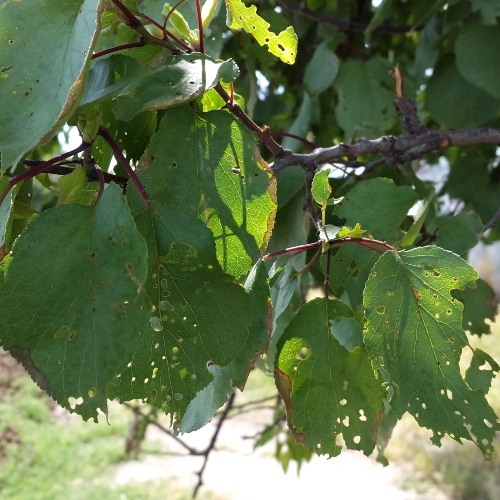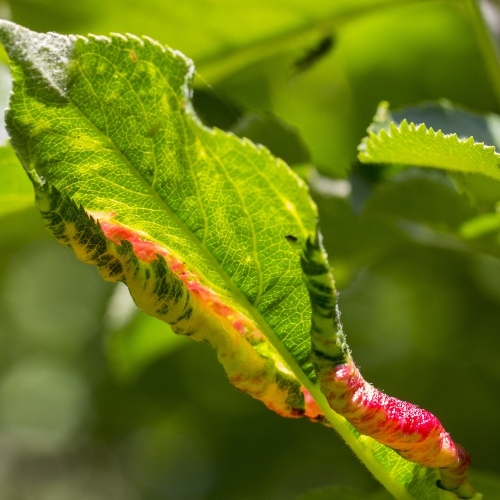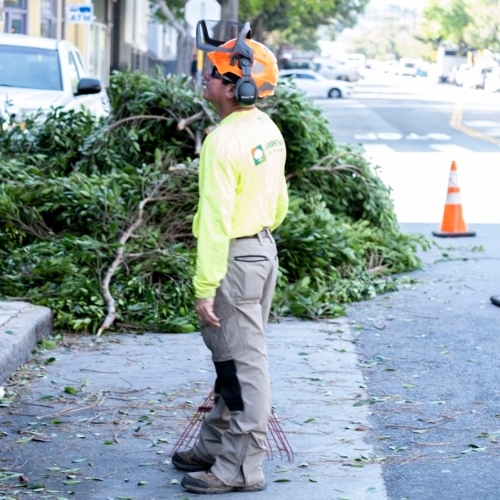Common Tree Diseases in the San Francisco Bay Area
Introduction
Trees are an essential part of the San Francisco Bay Area’s ecosystem, but they can face various challenges, including diseases that affect their health and appearance. As a homeowner in the Bay Area, it’s crucial to recognize the signs of common tree diseases to address them early and prevent further damage.
In this article, we’ll explore four of the most prevalent tree diseases in the region, their symptoms, and how to manage or prevent them.
1. Sooty Mold
What Is Sooty Mold?
Sooty mold is a fungal disease that primarily targets fruit trees during the warmer spring and summer months. While it doesn’t kill trees, it can severely impact their appearance and attract pests like aphids . The disease manifests as a black, almost furry mold on tree leaves, often accompanied by yellowing and curling foliage.
A Schleffera Plant with Sooty Mold – Amnon Shavit, CC BY-SA 3.0 , via Wikimedia Commons
How to Identify Sooty Mold
- Black, sooty mold coating leaves and branches.
- Curling and yellowing of leaves.
- Sticky residue (honeydew) on the tree, often caused by aphids or other pests.
Management and Prevention
- Remove Aphids: Since aphids contribute to the spread of sooty mold, use insecticidal soap or introduce beneficial insects like ladybugs to control them.
- Wash Fruit: Moldy fruit can still be salvaged; wash it thoroughly with mild soap and water.
- Prune Affected Areas: Remove infected branches to minimize the spread of the fungus.
2. Shot Hole Fungus
What Is Shot Hole Fungus?
Shot hole fungus , also known as coryneum blight, targets the Prunus species , including almond trees and stone fruit trees . This disease thrives in San Francisco’s warm and wet winters, leaving trees vulnerable to other infections.
Leaves with Shot Hole Fungus – Shuhrataxmedov, CC BY-SA 3.0 , via Wikimedia Commons
Symptoms of Shot Hole Fungus
- Small round holes in leaves.
- Browning and yellowing of leaves.
- Yellowing stems and premature leaf drop.
Management and Prevention
- Prune and Dispose: Prune infected leaves and dispose of them properly to prevent the spread.
- Improve Airflow: Thin out dense canopies to reduce humidity around the tree.
- Fungicide Application: Use copper-based fungicides in late winter or early spring to protect your trees.
- Minimize Pollutants: Urban pollutants can exacerbate the disease, so ensure that your trees are in a clean environment.
3. Fire Blight
What Is Fire Blight?
Fire blight is a highly contagious bacterial disease that affects apple and pear trees . This disease spreads quickly, often causing extensive damage within just a couple of weeks.
A Leaf with Signs of Fire Blight
Signs of Fire Blight
- Burned or scorched appearance on leaves, stems, and bark
- Wilted brown blossoms
- Brown bacterial ooze from infected areas
How It Spreads
Fire blight is spread by:
- Rain, wind, and insects (including bees).
- Birds and contaminated gardening tools.
Management and Prevention
- Sanitize Tools: Always disinfect pruning tools after working on infected trees to prevent disease spread.
- Remove Infected Areas: Prune affected branches at least 12 inches below the visible infection.
- Plant Resistant Varieties: Choose fire blight-resistant varieties of apple and pear trees for your landscape.
- Fungicides: Apply a preventative treatment in early spring when the disease is most active.
4. Chinese Elm Anthracnose
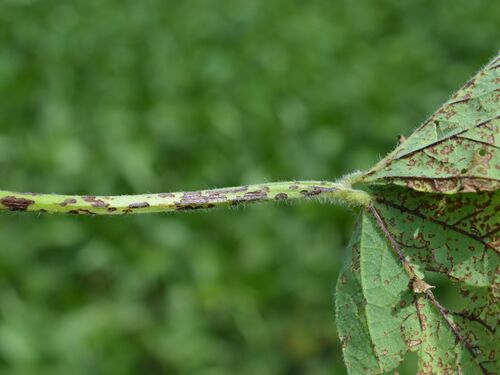
Anthracnose Causes Dark Lesions on Plant Stems and Leaves
What Is Chinese Elm Anthracnose?
Chinese elm anthracnose is a fungal disease that causes branch dieback and defoliation, particularly in Chinese elm trees , which are common throughout the San Francisco Bay Area. The fungus can also affect other tree species, weakening their defenses against pests and other diseases.
Symptoms of Chinese Elm Anthracnose
- Large black spots on leaves
- Cankers forming near the base of the tree
- Branches dying back from their tips
Management and Prevention
- Prune During Dormancy: Prune infected trees during the fall or winter to minimize the spread of the disease.
- Remove Cankers: Cut out cankers and dispose of infected wood.
- Maintain Tree Health: Ensure that your tree is adequately watered and fertilized to improve its resistance to infections.
Hiring Professionals for Tree Disease Control in the San Francisco Bay Area
Tree diseases can be difficult to manage without expert help, especially when multiple trees in your landscape are affected. Professional arborists have the experience and tools to diagnose, treat, and prevent tree diseases effectively.
The Arborist Now Crew Ensures Safe and Efficient Tree Cleanup in San Francisco
Why Choose Arborist Now?
At Arborist Now, we specialize in tree care and disease management for homeowners and businesses throughout the San Francisco Bay Area. Our services include:
- Disease diagnosis and treatment.
- Expert pruning and trimming to prevent infections.
- Customized care plans to keep your trees healthy year-round.
Don’t wait for tree diseases to worsen— contact Arborist Now today for professional assistance. Let us help you protect your trees and preserve the beauty of your landscape!
Final Thoughts
Keeping your trees healthy is vital to maintaining the beauty and value of your property. By understanding common tree diseases like sooty mold, shot hole fungus, fire blight, and Chinese elm anthracnose, you can take proactive steps to prevent and manage these issues.
If you suspect your trees are suffering from a disease, don’t hesitate to consult a professional arborist. Early intervention is key to preserving the health and longevity of your trees.
Originally posted on November 16, 2019
